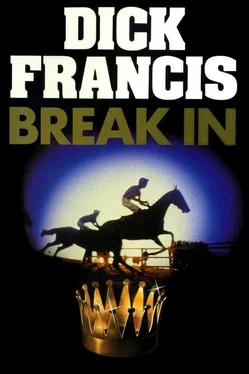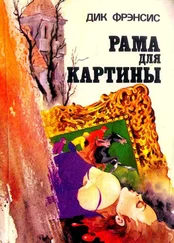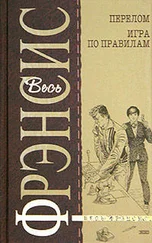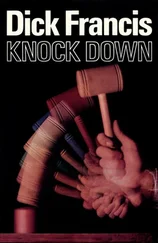‘No,’ Bobby said, half stuttering. ‘I mean, no I haven’t. But one or two people said ask your father for money, and I told them I couldn’t.’
‘And this bit,’ Maynard belted the air furiously with the newspaper, ‘about me fishing for a knighthood. I won’t have it. It’s a damned lie.’
It struck me forcibly at that point, perhaps because of an undisguisable edge of fear in his voice, that it was the bit a bout the knighthood which lay at the real heart of Maynard’s rage.
It was no lie, I thought conclusively. It was true. He must indeed be trying actively to get himself a title. Grandfather had said that Maynard at nine had wanted to be a lord. Maynard at fifty was still the same person, but now with money, with influence, with no doubt a line to the right ears. Maynard might be even then in the middle of delicate but entirely unlawful negotiations.
Sir Maynard Allardeck. It certainly rolled well off the tongue. Sir Maynard. Bow down to me, you Fieldings. I am your superior, bow low.
‘I didn’t say anything about a knighthood,’ Bobby protested with more force. ‘I mean, I didn’t know you wanted one. I never said anything about it. I never thought of it.’
‘Why don’t you sue the newspaper?’ I said.
‘You keep quiet,’ he said to me vehemently. ‘Keep your nose out.’ He readdressed himself to Bobby. ‘If you didn’t mention a knighthood on the telephone, how did they get hold of it? Why did they write that... that damned lie? Answer me that.’
‘I don’t know,’ Bobby said, sounding bewildered. ‘I don’t know why they wrote any of it.’
‘Someone has put you up to stirring up trouble against me,’ Maynard said, looking hard and mean and deadly in earnest.
We all three stared at him in amazement. How anyone could think that was beyond me.
Bobby said with more stuttering, ‘Of course not. I mean, that’s stupid. It’s not you that’s in trouble because of what they wrote, it’s me. I wouldn’t stir up trouble against myself. It doesn’t make sense.’
‘Three people telephoned me before seven this morning to tell me there was another paragraph in today’s Flag,’ Maynard said angrily. ‘I bought a copy on my way here. I was instantly certain it was your poisonous brother-in-law or his pig of a grandfather who was at the back of it, it’s just their filthy sort of thing.’
‘No,’ Holly said.
Maynard ignored her as if she hadn’t spoken.
‘I came in here to tell you it served you right,’ he said to Bobby, ‘and to insist on your forcing the Fieldings to get a full retraction printed in the paper.’
‘But,’ Bobby said, shaking his head as if concussed, ‘it wasn’t Kit. He wouldn’t do that. Nor his grandfather.’
‘You’re soft,’ Maynard said contemptuously. ‘You’ve never understood that someone can smile into your face while they shove a knife through your ribs.’
‘Because of Holly,’ Bobby insisted, ‘they wouldn’t.’
‘You’re a naive fool,’ his father said. ‘Why shouldn’t they try to break up your marriage? They never wanted it, any more than I did. They’re a wily, shifty, vengeful family, the whole lot of them, and if you trust any one of them, you deserve what you get.’
Bobby gave me a quick glance in which I read only discomfort, not doubt. Neither Holly nor I offered any sort of defence because mere words wouldn’t dent the opinions that Maynard had held all his life, and nor would hitting him. Moreover we had heard the same sort of invective too often from Grandfather on the subject of the Allardecks. We were more or less immune, by then, to violent reaction. It was Bobby, interestingly, who protested.
‘Kit and Holly care what becomes of me,’ he said. ‘You don’t. Kit came to help, and you didn’t. So I’ll judge as I find, and I don’t agree with what you say.’
Maynard looked as if he could hardly believe his ears, and nor, to be honest, could I. It wasn’t just that what Bobby was expressing was a heretical defection from his upbringing, but that he also had the courage to stand up to his father and say it to his face.
He looked, as a matter of fact, slightly nervous. Maynard, it was said, inspired wholesale nervousness in the boardroom of any business his eye fell on, and as of that morning I understood why. The unyielding ruthlessness in him, clearly perceptible to all three of us, was central to his success, and for us at least he made no attempt to disguise it or dress it with a façade of charm.
Bobby made a frustrated gesture with both hands, walked over to the sink and began to fill the kettle.
‘Do you want any coffee?’ he said to his father.
‘Of course not.’ He spoke as if he’d been insulted. ‘I’ve a committee meeting at the Jockey Club.’ He looked at his watch, and then at me. ‘You,’ he said, ‘have attacked me. And you’ll suffer for it.’
I said calmly but distinctly, ‘If I hear you have said in the Jockey Club that a Fielding is responsible for what has appeared in the Flag , I will personally sue you for slander.’
Maynard glared. He said, ‘You’re filth by birth, you’re not worth the fuss that’s made of you, and I’d be glad to see you dead.’
I felt Holly beside me begin to spring forward in some passionate explosion of feeling and gripped her wrist tight to stop her. I was actually well satisfied. I had read in Maynard’s eyes that he was inclined to take me seriously, but he didn’t want me to know it, and I understood also, for the first time, and with unease, that the very fact of my being successful, of being champion, was to him, in his obsession, intolerable.
Along at the Jockey Club, which had its ancient headquarters in Newmarket’s main street, and where he had been one of its members for four or five years, Maynard would with luck now pass off the whole Flag thing with a grouchy joke. There, in the organisation which ruled the racing industry, he would show all courtesy and hide the snarl. There, where he served on dogsbody committees while he made his determined way up that particular ladder, aiming perhaps to be a Steward, one of the top triumvirate, before long, he would now perhaps be careful to say nothing that could get back to my ears.
There were no active professional jockeys in the Jockey Club, nor any licensed trainers, though a few retired practitioners of both sorts sprinkled the ranks. There were many racehorse owners, among whom I had real friends. The approximately 140 members, devoted to the welfare of racing, were self-perpetuating, self-elected. If Maynard had ever campaigned quietly to be chosen for membership it might have helped him to be a member of an old-established racing family, and it might have helped him to be rich, but one thing was certain: he would never have unsheathed for the civilised inspection of his peers the raw, brutal anti-Fielding prejudice he had given spleen to in the kitchen. Nothing alienated the courteous members more than ill-mannered excess.
The preserving of Maynard’s public good manners was very much my concern.
He went as he’d come, private manners non-existent, walking out of the kitchen without a farewell. We listened to the firm footsteps recede and to the distant slam of a car door, and his engine starting.
‘Do you realise,’ Bobby said to me slowly, ‘that if he’s made a Steward and you’re still a jockey... you’d be horribly vulnerable...?’
‘Mm,’ I said dryly. ‘Very nasty indeed.’
I rode at Plumpton. A typical day of four rides; one win, one third, one nowhere, one very nearly last, with owner reactions to match.
Far more people than in the previous week seemed to have seen the pieces in Intimate Details, and I spent a good deal of the day assuring all who asked that, no, Bobby wasn’t bankrupt, and yes, I was certain, and no, I couldn’t say for sure what Bobby’s father’s intentions were in any respect.
Читать дальше




